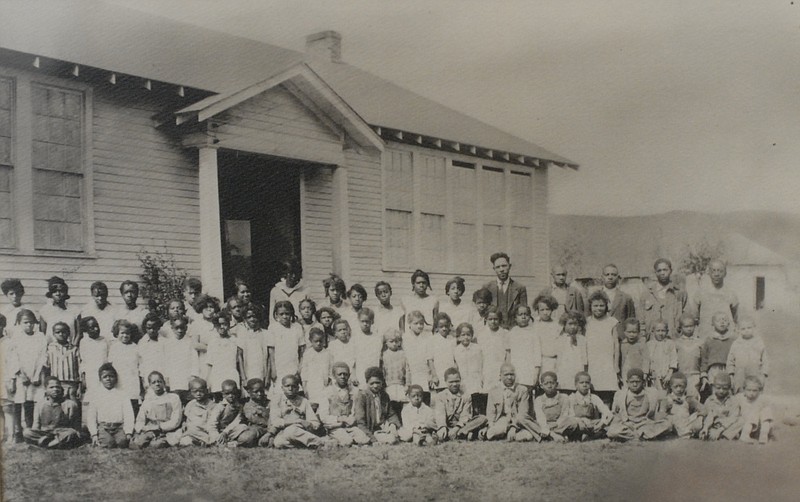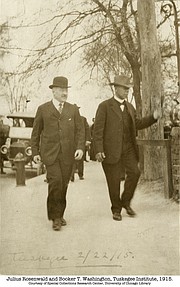From 1912 until his death in 1932, Julius Rosenwald helped educate more than 660,000 African Americans, and yet many people - including those who attended the 5,000 elementary schools he helped fund - never heard of him until recently.
"I had heard of Booker T. Washington, of course, but I never heard of Mr. Rosenwald until it was posted on our Facebook page," said Rosemary Armour, who attended the Roland Hayes school off of Amnicola Highway from 1959 to 1966.
Dorothy Canter, a Bethesda, Maryland-based scientist and a huge fan of national parks, is hoping to change that by having Rosenwald honored with a national park named in his honor.
"I am a national parks junkie," Canter said.
"I saw the documentary 'Rosenwald' and realized I didn't know anything about him, but I know a lot about national parks, and I realized there needs to be a national park for him."
(READ MORE: Rosenwald Schools benefit Hamilton County)
Canter will be in Chattanooga on Monday evening to present "The Legacy of Julius Rosenwald and the Rosenwald Schools National Historical Park Campaign" as part of the Moccasin Bend Lecture Series.
The lecture will be free in person at 7 p.m at the IMAX theater, and via Zoom.
Rosenwald was born into poverty, the son of Jewish immigrants, and led Sears, Roebuck & Co. to national success. He was a problem solver and forward thinker who took what he learned from business into the world of philanthropy.
"He created the idea of 100% satisfaction or your money back and a system for making the assembly line work. Henry Ford came to him to learn about it," Canter said.
After making his wealth, he turned to philanthropy, but his ideas came with a twist. He didn't just want to write a check and be done with it.
He required that communities, Black and white, have skin in the game. He came up with the idea of challenge grant agreements under which he would provide a set amount of money if the community raised that much and more.
(READ MORE: Photographer Andrew Feiler documents the Rosenwald Schools of the Jim Crow South)
He first conceived the idea, according to Canter, to help build YMCAs for African Americans across the country and offered to put up $25,000 for any community or city that raised $75,000 for such a project. This drew the attention of educator, author, orator and co-founder of the Tuskegee Institute, Booker T. Washington, Canter said.
"In addition to everything else, Booker T. Washington was a great fundraiser," she said.
The two met and became allies.
"These communities thirsted for knowledge," Canter said, and "this project was the vision of Booker T. To build schools in the South."
Rosenwald, Canter said, achieved the American dream "and became rich beyond his wildest dreams and used that wealth to do philanthropy."
The Rosenwald Schools, as they were known throughout the country, were more than just a building for book learning. They were centers of the community that also often had housing for teachers and other buildings on the campus that were used by people living nearby.
In all, there were 5,357 such buildings erected. Many were added onto or altered over the years as the schools grew or were brought into the city or county systems, if not entirely demolished. At least eight Rosenwald schools were built in the Chattanooga area, according to Jennifer Crutchfield with National Park Partners.
Canter has been a volunteer for the National Parks Conservation Association for 34 years and served on the board of trustees from 1988 to 1997.
She is the president of the campaign to create the Julius Rosenwald & Rosenwald Schools National Historical Park.
Canter believes the work Rosenwald did in creating schools in 15 Southern states - including for 44,000 students in Tennessee - during the Jim Crowe era of the early- to mid-20th Century deserves to be recognized.
She said that of the 423 parks such as the Washington and Lincoln memorials that commemorate the life and work of individuals, not one honors a Jewish American.
It is her hope that a visitors center will be built in the Chicago area, where Rosenwald lived and worked, and that eventually some sort of designation will be given to at least some of the 55 schools (and one teacher's home) that were recommended by 14 states in the application for designation.
Congress in 2020 passed a bill for the National Parks Service to study the idea, and Canter said it is her personal hope the idea will be approved by Dec. 31, 2024.
(READ MORE: Spared from demolition, 1920s black schoolhouse being saved)
The schools in the Chattanooga area were the Booker T. Washington School, Bakewell School, Chickamauga School, Georgetown School, Hixson School, Roland Hayes School, Summit School, Eastdale School and Washington School, according to Crutchfield.
The Lincoln Consolidated Rosenwald School in Pikeville, Tennessee, still stands.
Janice Bostic attended Roland Hayes until sixth grade, from 1957-1962, while Rosemary Armour and Stephanie Saxton attended from 1959-1965. The two have been great friends ever since and plan to attend their 50th class reunion along with other Riverside High School graduates this year.
The Hayes school was located on Riverside Drive off Amnicola Highway near the intersection of Crutchfield Avenue. The structure was demolished in 1971.
Both Saxton and Armour said they only found out theirs was a Rosenwald school in recent weeks. Saxton said some of her classmates communicate through Facebook, and they are hoping to have some sort of marker placed at the former school's location.
"I was surprised to hear it was a Rosenwald school and to hear how many schools there were around the country," Saxton said. "And here. My grandparents and parents went to Booker T. Washington School. The history never came up."
Armour said she had heard of Washington before, but not Rosenwald.
"It was a wonderful school and place to grow up," she said.
All three women said the most memorable thing about the Hayes school was the sense of community. After a career as a medical social worker, Bostic has returned to Chattanooga and lives in her childhood home.
"It definitely was a community school," Bostic said. "The ladies in the cafeteria were from the community, and all my friends went there. It was so close we all just walked. The main thing with it being a community school was the closeness of neighborhood kids, and the teachers were all very nurturing and caring.
"A lot of our values were instilled from that environment. I remember also that someone used to come in and teach Bible classes, which might not happen today, but that was a positive," Bostic said.
"My memories are the times we did plays," Saxton said. "We had lots of arts and field days and interaction with the cafeteria staff. They and the teachers lived in the community and knew our parents. They would call our parents if we were showing out, and they [the parents] would come to the school. I never did get in trouble because I knew better."
Contact Barry Courter at bcourter@timesfreepress.com or 423-757-6354.

